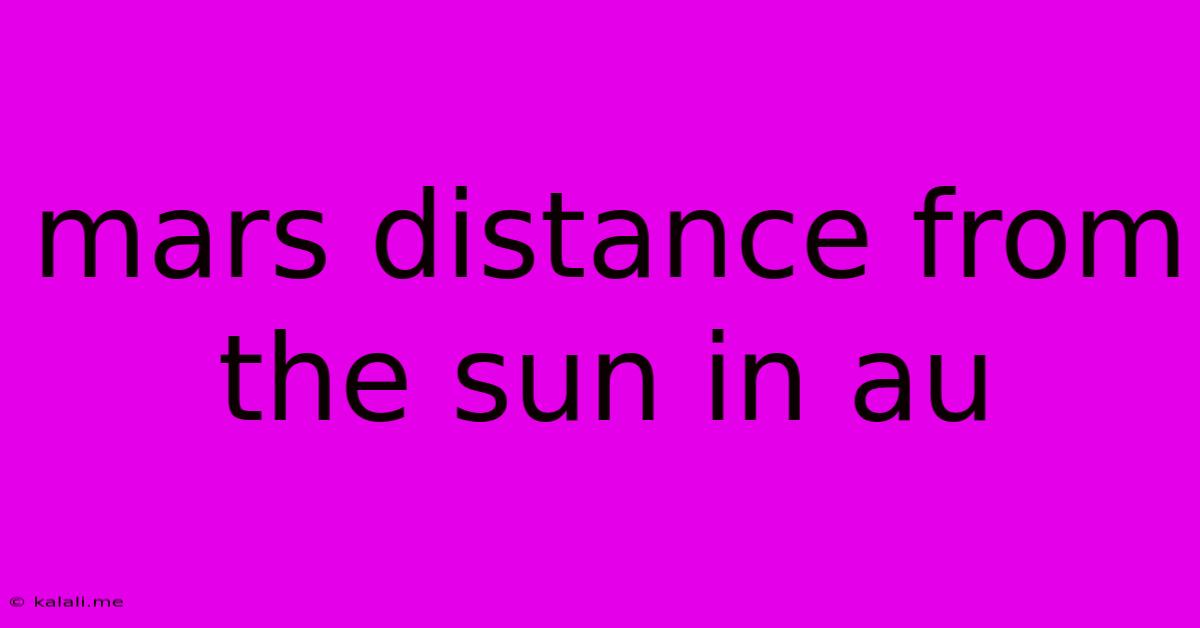Mars Distance From The Sun In Au
Kalali
May 10, 2025 · 3 min read

Table of Contents
Mars' Distance from the Sun in AU: An In-Depth Look
Mars, the fourth planet from our Sun, holds a captivating allure for scientists and space enthusiasts alike. Understanding its orbital characteristics, particularly its distance from the Sun, is crucial to comprehending its climate, geology, and potential for harboring life. This article delves into the specifics of Mars' distance from the Sun, expressed in astronomical units (AU), exploring its variations and implications.
What is an Astronomical Unit (AU)?
Before we dive into the specifics of Mars' distance, it's important to define the unit of measurement we'll be using: the astronomical unit (AU). One AU is the average distance between the Earth and the Sun, approximately 93 million miles (149.6 million kilometers). Using AU provides a convenient and relatable scale for comparing distances within our solar system.
Mars' Average Distance from the Sun
Mars' average distance from the Sun is approximately 1.52 AU. This means it's about 1.52 times farther from the Sun than Earth. This greater distance significantly impacts Mars' solar radiation levels and, consequently, its temperature and atmospheric conditions. The reduced sunlight results in a much colder average temperature on Mars compared to Earth.
The Elliptical Orbit and Variable Distance
It's crucial to understand that planets don't orbit the Sun in perfect circles. Instead, they follow elliptical paths. This means Mars' distance from the Sun constantly varies throughout its orbit. At its closest point, or perihelion, Mars is about 1.38 AU from the Sun. At its farthest point, or aphelion, it's about 1.66 AU away. This variation in distance plays a significant role in the Martian seasons, influencing temperature fluctuations across the planet.
Implications of Mars' Distance
The varying distance from the Sun has profound consequences for Mars:
-
Temperature Fluctuations: The distance variation directly affects the amount of solar radiation received, causing significant temperature differences between perihelion and aphelion. This contributes to the extreme temperature variations observed on Mars.
-
Seasonal Variations: The elliptical orbit combined with the axial tilt of Mars results in highly variable seasons. The duration and intensity of Martian seasons differ considerably from those on Earth.
-
Atmospheric Conditions: The reduced solar radiation at Mars' greater distance contributes to its thin and cold atmosphere. The lower atmospheric pressure also contributes to the difficulties faced in sustaining liquid water on the planet's surface.
-
Space Exploration Challenges: The greater distance necessitates longer travel times for spacecraft missions to Mars, impacting mission planning and resource allocation. Understanding the variations in distance is essential for accurate trajectory calculations and mission optimization.
Further Research and Exploration
The ongoing exploration of Mars, through robotic missions and future human exploration, continues to refine our understanding of the planet's orbital dynamics and their impact on its environment. Precise measurements of Mars' distance from the Sun, obtained through advanced tracking techniques, contribute to improved models of its climate and geological history. Future research promises to provide even greater insights into this fascinating and enigmatic planet. The study of its orbital characteristics, including its distance from the Sun in AU, remains crucial in our quest to unravel the mysteries of Mars.
Latest Posts
Latest Posts
-
How Many Liters Has In Half Gallon
Jul 15, 2025
-
How Much Is Half Of A Mile
Jul 15, 2025
-
What Letter Is Halfway Through The Alphabet
Jul 15, 2025
-
How Many Cups Of Chocolate Chips In 4 Oz
Jul 15, 2025
-
If Your 31 What Year Were You Born
Jul 15, 2025
Related Post
Thank you for visiting our website which covers about Mars Distance From The Sun In Au . We hope the information provided has been useful to you. Feel free to contact us if you have any questions or need further assistance. See you next time and don't miss to bookmark.